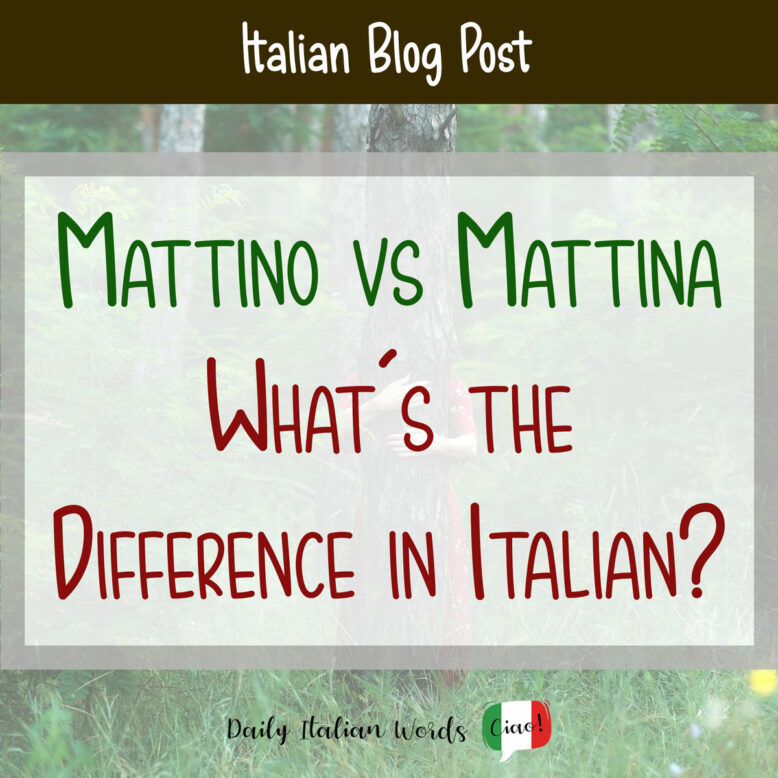Mattino (masculine) and mattina (feminine), both of which translate as morning in English, are two words of different genders that derive from the same Latin adjective matutinus. They indicate the part of the day between dawn and noon.
Their respective plurals are mattini (masculine) and mattine (feminine).
Knowing which word to use and when can be quite difficult for Italian learners of any level, but there are a few basic guidelines you can follow.

When ‘mattina’ and ‘mattino’ are the same
The first thing worth remembering is that, quite often, mattino and mattina are completely interchangeable. (Yes, cue the confetti!) When talking about the time of day according to the clock, for example, you can say:
Alle 7 di / della mattina*
Alle 7 del mattino
At 7 in the morning
Both phrases translate as « at 7 in the morning » in English with no difference in meaning.
*Note: although many dictionaries show della mattina in their phrase examples, the use of the preposition di is very common in Italian.
Likewise, when modifying the word for morning with an adjective such as sereno (serene) or piovoso (rainy), you can use either gender.
Una mattina serena
Un mattino sereno
A serene morning

When ‘mattina’ and ‘mattino’ differ
Generally speaking, the feminine mattina is heard more often than the masculine mattino, and this is because it is the dominant form when talking about specific dates or routines.
Specific dates
- questa mattina (or stamattina) = this morning
- ieri mattina = yesterday morning
- domani mattina (or domattina) = tomorrow morning
- martedì mattina = Tuesday morning
- la mattina di Natale = Christmas morning
Routines
- tutte le mattine = every morning
- alcune mattine = some mornings
- ogni altra mattina = every other morning
- la mattina prima = the previous morning
- la mattina dopo = the next morning
- di prima mattina = in the early morning
- dalla sera alla mattina = from evening until morning
Mattino, on the other hand, tends to appear more frequently in idiomatic expressions such as:
- sul far del mattino (lit: on the doing of the morning) = at daybreak
- di buon mattino (lit: of good morning) = early in the morning
- il mattino della vita (lit: the morning of one’s life) = one’s childhood
- un bel mattino (lit: one fine morning) = all of a sudden
- durare lo spazio di un mattino (lit: to last the space of a morning) = to last a short period of time
- il buon giorno si vede dal mattino (lit: the good day is seen from the morning) = one can guess what will happen from the early signs
- il mattino ha l’oro in bocca (lit: the morning has gold in its mouth) = the morning is the most productive time of day
Mattino is also the preferred form when the word morning describes a noun, such as for example, preghiere del mattino (morning prayer), stella del mattino (morning star), sole del mattino (morning sun) or turno del mattino (morning shift).

Al mattino, di mattina, la mattina, mattinata
In Italian, you can say in the morning in various ways, and the difference between these expressions is subtle.
- Al mattino / alla mattina si lavora meglio = One works better in the morning
- Di mattina si lavora meglio = One works better in the morning
- Preferisco lavorare alla / la mattina = I prefer to work in the morning
Unfortunately it isn’t easy to explain when one expression works better than another. It can depend on the context, region or simply one’s personal habit. For example, the weather forecaster will often use al mattino.
Sono previste nubi e piogge moderate al mattino sull’alta Toscana.
Clouds and moderate showers are expected in the morning in upper Tuscany.
Finally, we have the word mattinata, a derivative of mattina that refers to the hours of the morning considered as a whole, with specific reference to the activities or the atmospheric conditions that characterise it. The expression in mattinata means during the morning or sometime in the morning without being specific about a time. In this case, it only exists in the feminine form.
Ti telefono in mattinata.
I’ll phone you sometime in the morning.

Still confused about mattino and mattina? Our advice is: if you aren’t sure which to use, play it safe and go with the feminine form. Even if you get it wrong now and then, you will be understood! 🙂
Be sure to check out our article all about the different ways to say “Good morning!” in Italian.
Heather Broster is a graduate with honours in linguistics from the University of Western Ontario. She is an aspiring polyglot, proficient in English and Italian, as well as Japanese, Welsh, and French to varying degrees of fluency. Originally from Toronto, Heather has resided in various countries, notably Italy for a period of six years. Her primary focus lies in the fields of language acquisition, education, and bilingual instruction.


